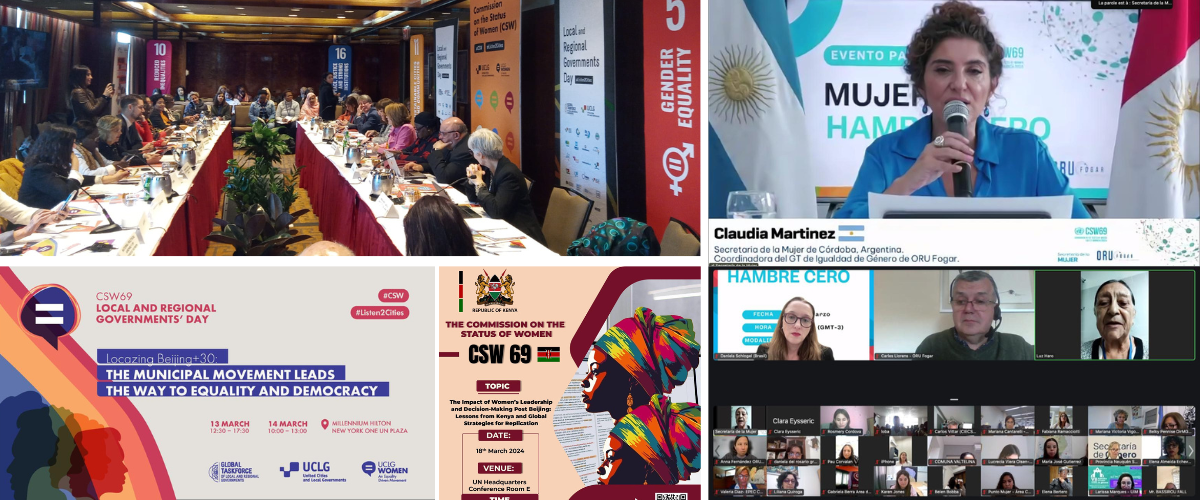Regions reaffirm their commitment to Equality at CSW69

In the framework of the 69th Commission on the Status of Women (CSW69), organised by the United Nations in New York, regional governments have underlined their key role in the localisation of gender equality and the implementation of the 2030 Agenda.
As the first event within the CSW69, on 12 March, ORU Fogar organised the webinar "Women and Zero Hunger". This virtual session, promoted by the organisation's Gender Equality Working Group, brought together leading experts and institutional representatives to address the key role of women in the eradication of hunger and food security. In the wake of the V Summit of Zero Hunger Regions, held in October in Barcelona, the event crossed two essential agendas for ORU Fogar: gender equality and food security. During the session, the need to integrate gender equality in public policies to guarantee fair access to resources and to strengthen women's leadership in food production and distribution was highlighted.
Maria Noel Vaeza, Director for the Americas at UN Women, highlighted the importance of women's participation in decision-making and emphasised the urgency of reducing the gender digital divide. Daniela Schlogel, representative of Zicosur and the Government of Paraná, addressed the worrying reality of feminicide in Brazil and the strategies in her state to combat gender violence. The Ecuadorian feminist activist, Luz Haro, proposed dedicating a decade to rural women in order to halt the rural exodus and promote food sovereignty. Aïcha Loba, from the Nawa region of Côte d'Ivoire, highlighted the impact on food self-sufficiency of improving women's access to land and financial services. Rosmery Cordoba, from the Mancomunidad Regional de los Andes, Peru, highlighted the role of women in community organisation and the fight against poverty. Claudia Martinez, coordinator of the Working Group, highlighted the importance of the advocacy of intermediate governments in the CSW69.
During the "Local and Regional Governments Day", representatives of various regional governments participated in various sessions to highlight their commitment to feminist leadership and multilevel governance as key tools for equality. The event, organised by Global Tashforce and held on 13-14 March at the Millennium Hilton New York One UN Plaza, was attended by UN Women and other international organisations. In the session "Localizing Equality: Women's Leadership and Multilevel Governance for Beijing+30 and the 2030 Agenda", regional governments reaffirmed that gender equality is not only a goal in itself, but also an essential condition for sustainable development.
One of the central aspects of the discussion was the presentation of the Report of the Global Taskforce of Local and Regional Governments on the localisation of SDG 5, which will be taken to the 2025 High Level Political Forum. This document emphasises the need for a gender perspective in all local and regional policies to eradicate poverty and inequality.
During the event, key interventions highlighted the commitment of various regions to this agenda. Miren Elgarresta, from Emakunde, the Basque Women's Institute, presented her comprehensive approach to ensure women's equal participation in decision-making and the eradication of gender-based violence. The prefect of Santo Domingo de Tsáchilas, Ecuador, Johanna Nuñez, shared experiences on regional policies for the inclusion of women in economic and social development. The Secretary for Women of the State of Paraná, Brazil, Leandra Dal Ponte, highlighted the progress made in training and women's empowerment programmes in the cities of the state. Lucy Malili, Deputy Governor of Makueni County, on behalf of the Council of Governors of Kenya, underlined the importance of cooperation between regions to strengthen gender equality through legislative and development initiatives.
The second day of activities focused on the need to involve men as allies in the struggle for equality. Strategies to promote caring and participatory models of leadership were explored. In addition, the session "Sustaining Political Will and Expanding Alliances" discussed strategies for strengthening alliances between local and regional governments, international organisations and civil society to ensure financing for gender equality policies in the lead up to the Fourth Financing for Development Conference and the World Social Summit.
With their participation in CSW69, regional governments have reaffirmed their commitment to gender equality, demonstrating that action on the ground is key to global transformation. Their active involvement in the localisation of Beijing+30 and the 2030 Agenda undoubtedly reinforces the role of regions as drivers of change towards fairer and more inclusive societies.










































































